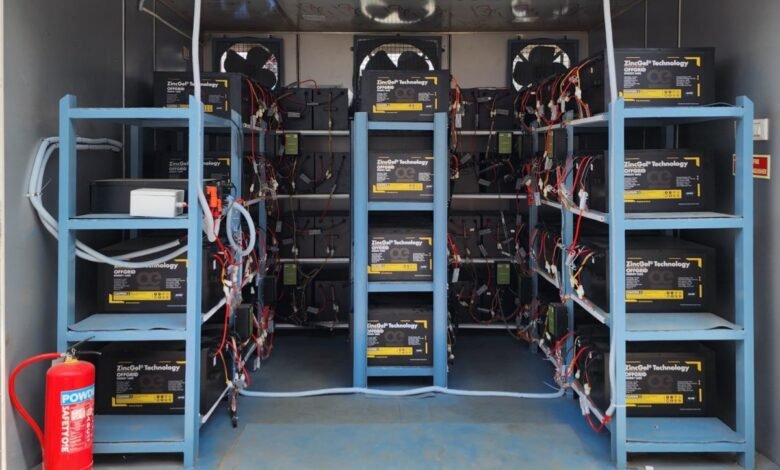Offgrid Raises $15M to Pioneer Lithium-Free Battery Storage

▼ Summary
– Lithium batteries face limitations like volatile supply chains and short lifespans, prompting Offgrid Energy Labs to develop an alternative called ZincGel.
– ZincGel is a zinc-bromine-based battery system offering 80–90% of lithium’s energy efficiency at a lower cost and with reduced fire risk.
– The startup raised $15 million to scale operations, including building a UK demonstration facility by 2026 and planning a gigafactory in India.
– ZincGel batteries last twice as long as lithium-ion, handle longer discharges, and operate in diverse environmental conditions, including temperatures as low as -10°C.
– Offgrid targets industries with net-zero goals and has early testers like Shell and Tata Power, focusing on renewable energy storage and decentralized solutions.
Offgrid Energy Labs has secured $15 million in Series A funding to advance its innovative zinc-bromine battery technology, offering a promising alternative to lithium-ion storage systems. The India-based startup aims to address critical challenges in the renewable energy sector, including supply chain volatility, high costs, and safety concerns associated with conventional lithium batteries.
Founded in 2018 at IIT Kanpur, Offgrid has developed a proprietary battery system named ZincGel. This technology delivers 80–90% of the energy efficiency of lithium-ion batteries but at a significantly lower levelized cost of storage. The company emphasizes that its solution relies on widely available materials like zinc and bromine, reducing dependency on China-dominated lithium supply chains.
With global power demand rising, countries like India are aggressively expanding renewable energy storage. India aims to reach 500 gigawatts of non-fossil energy capacity by 2030 and has announced substantial funding for battery storage infrastructure. Offgrid’s technology aligns with these goals by providing a safer, longer-lasting, and more economically viable storage option.
ZincGel batteries use a water-based electrolyte, which minimizes fire risk, a significant advantage over flammable lithium-ion alternatives. They support longer discharge cycles of 6–12 hours and boast a lifespan roughly double that of typical lithium batteries. The design also incorporates a carbon-based cathode, enabling efficient charging and discharging.
The startup has already filed more than 25 patent families across key markets including the U.S., U.K., India, China, Australia, and Japan. Its approach not only avoids scarce materials like graphite but also allows customization based on specific applications, functioning reliably even in temperatures as low as -10°C.
Offgrid is initially targeting industrial clients with net-zero commitments, focusing on applications such as peak shifting and off-grid energy solutions. Early testing partners include Shell and Tata Power, with ongoing discussions with major European energy firms like Enel.
A 10-megawatt-hour demonstration facility is planned in the U.K., expected to be operational by early 2026. The choice of the U.K. was influenced by Europe’s established battery manufacturing ecosystem and the presence of two co-founders there. The company emphasizes that this facility will have a carbon footprint 50% lower than traditional lithium gigafactories.
The Series A round was led by Archean Chemicals, a specialty chemicals manufacturer with expertise in bromine production, which now holds a 21% stake. Ankur Capital also participated. The post-money valuation of Offgrid stands at approximately $58 million.
Looking ahead, Offgrid plans to commercialize ZincGel by late 2026, with a gigafactory in India envisioned as part of its long-term scaling strategy.
(Source: TechCrunch)





